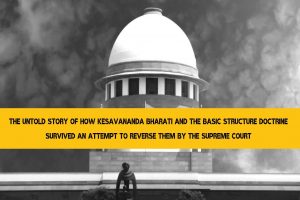Few persons know that the most momentous judgment of the Indian Supreme Court in constitutional law delivered on 24-4-1973 by the largest Bench of 13 Judges in Kesavananda Bharati v. State of Kerala1 was subjected to a serious attempt to overrule it by a review by another Bench of 13 Judges for two days on 10-11-1975 and 11-11-1975 but on the third day the review was suddenly and inexplicably abandoned and the 13-Judge Bench was dissolved.
The circumstances under which the review was made and given up have for long been clouded in mystery and lawyers and judges have speculated about it till now. No official record or report exists of this attempt to review Kesavananda1 judgment. The review took place during the height of the Emergency when even the reporting of courts’ judgments by the press was restricted. Today, it is possible to piece together the full story of this important event in our constitutional history from a few published and mostly unpublished accounts, memoirs of some of the participants in the review and interviews by this writer and others of judges constituting the reviewing Bench.
It is a story as dramatic as instructive. It is an extension of the saga of the extraordinary circumstances in which Kesavananda1 itself was heard for five months between 1972-1973. As a matter of interaction of constitutional law with politics of the day as well as for difficulties in formulating the abstruse concept of the basic structure of the Constitution, the story of Kesavananda1 and the attempted reversal of Kesavananda1 requires to be widely known. In the United States, landmark Supreme Court decisions in Marbury v. Madison2, Dred Scott v. Sandford3, Brown v. Board of Education4 have been commented on for their political and social background as well as for the actual decision making by judges. Such an exercise has not been done for any important case of the Supreme Court of India. Kesavananda1 is one case which requires to be related in its political background and the actual decision making to understand it.
† Senior Advocate, Supreme Court of India, former Solicitor General of India (1996-1998), Advocate General of Maharashtra (1993-1995).
2 2 L Ed 60 : 5 US (1 Cr) 137 (1803).
3 15 L Ed 691 : 60 US 393 (1856).
4 98 L Ed 873 : 347 US 483 (1953).

